|
|
|
Sort Order |
|
|
|
Items / Page
|
|
|
|
|
|
|
| Srl | Item |
| 1 |
ID:
061176
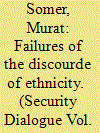

|
|
|
| 2 |
ID:
102357
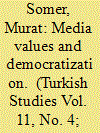

|
|
|
|
|
| Publication |
2010.
|
| Summary/Abstract |
This article presents a systematic content analysis of three religious-conservative and two pro-secular newspapers in 1996-2004 in Turkey, and discusses some findings and their implications regarding elite values and democratization: considerable internal pluralism within both religious-conservative and pro-secular elites; general consensus on democracy but not on democratic norms' application to specific issues and groups other than one's own; a division of values on religion, secularism, and social pluralism; political value change in favor of liberal democracy but social conservatism among religious-conservative elites; fragmentation and relative cynicism, but not necessarily authoritarianism, among pro-secular elites; weak ideational change on the Kurdish issue. The article argues that the press plays a significant political role as a site where elite values change or are reproduced through discussion, deliberation, or silence. Values affect and are affected by political developments.
|
|
|
|
|
|
|
|
|
|
|
|
|
|
|
|
| 3 |
ID:
079685
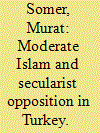

|
|
|
|
|
| Publication |
2007.
|
| Summary/Abstract |
Developing an argument based in theories of democratic consolidation and religious competition, and discussing the reasons for the secularist opposition to the government, this article analyses how government by a party rooted in moderate Islamism may affect Turkey's peculiar secular democracy, development and external relations and how Muslims in the world relate to modernization and democracy. Arguing that secularism in advanced democracies may be a product of democracy as much as it is the other way around, the article maintains that democratic consolidation may secure further consolidation of Turkish secularism and sustainable moderation of Turkish political Islam. Besides democratic Islamic - conservative actors and other factors, democratic consolidation requires strong democratic - secularist political parties so that secularist and moderate Islamist civilian actors check and balance each other. Otherwise, middle class value divisions and mistrust in areas like education and social regulation may jeopardise democratisation and economic modernisation and continuing reconciliation of Islamism with secular democracy and modernity
|
|
|
|
|
|
|
|
|
|
|
|
|
|
|
|
| 4 |
ID:
135841
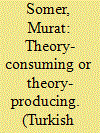

|
|
|
|
|
| Summary/Abstract |
Case studies of Turkey are typically read and cited as narratives of the Turkish case itself, suppliers of case-specific data, or at best, applications of more general theories. They are not perceived as theory-testing, producing, or even informing exercises. While this tendency partly results from the institutional, geographical–cultural, and methodological biases of extant social sciences, scholars may also be to blame for neglecting theory-development or for producing descriptive narratives. How can Turkish Studies scholars successfully contribute to general theory-development in their respective disciplines? The main value of Turkey for producing theory may lie in its rare combination of many qualities and in its temporal and regional variations. Thus, this article argues that, besides small-N and large-N comparative studies, the most promising way Turkish Studies can engage in theory-building may be by examining Turkey as a theory-developing critical case, i.e. as a crucial or, pathway or within-unit comparative case. For this, scholars would carefully design their studies as theory-infirming, theory-confirming, or theory-producing crucial case studies, utilize temporal and cross-sectional comparisons, and pay special attention to causal mechanisms, sequences, and processes. By using evidence from publications that draw on the Turkish case, the article shows that, since the 1990s, scholars have produced more research published in highly ranked journals of comparative politics, international relations and area studies. They also generate more single case studies with general theoretical ambitions and more visibility but so far with unclear actual theoretical impact. The article discusses some qualities of Turkey which make it a promising critical case for theory-development and how studying it this way can also help to achieve a better understanding of Turkey itself.
|
|
|
|
|
|
|
|
|
|
|
|
|
|
|
|
| 5 |
ID:
051846
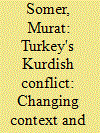

|
|
|
|
|
| Publication |
Spring 2004.
|
| Summary/Abstract |
This article develops new analytical categories that are necessary to analyze Turkey's Kurdish conflict in its changed domestic and international environments and to evaluate the policy options. If Turkish state policies and discourse, and that of the other regional and international actors, signal to Kurds that the Turkish and Kurdish identities are mutually exclusive categories with rival interests, radical shifts may occur in Turkish Kurds' social and political identities and preferences. If state policies promote these identities as complements with compatible interests, radical shifts are unlikely and Turkey can play a more constructive regional role.
|
|
|
|
|
|
|
|
|
|
|
|
|
|
|
|
| 6 |
ID:
096911


|
|
|
| 7 |
ID:
082693
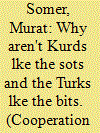

|
|
|
|
|
| Publication |
2008.
|
| Summary/Abstract |
By modelling and analysing Turkey's Kurdish question in light of democratic transition theories, the Scottish Case and recent developments, this article explains the lack of cooperation between the `moderate' Turkish majority and Kurdish actors pursuing peace and European Union membership. It analyses whether there may be more cooperation in the near future and discusses implications for theories of political moderation. A `most different case', Scotland, helps in explaining the Turkish case and in avoiding mono-causal explanations based on cultural stereotypes. Among other factors and unlike the Scottish case, cooperation in the Turkish-Kurdish case is constrained by relations with Iraqi Kurds and the difficulty of identifying the moderates: Kurdish actors moderate in the sense of renouncing violence often make more hard-line political and conceptual claims than violent actors do. Theories need more multifaceted conceptualizations of moderation. The recent electoral success of the ruling political party and the presence of a Kurdish political party in Parliament may enable more moderate-moderate cooperation in the future. This will occur if potentially moderate actors can distance themselves from violence and choose conceptual and political compromise over coercion, and if Turkey, Iraqi-Kurds and the United States can reach an agreement on cooperation.
|
|
|
|
|
|
|
|
|
|
|
|
|
|
|
|
|
|
|
|
|